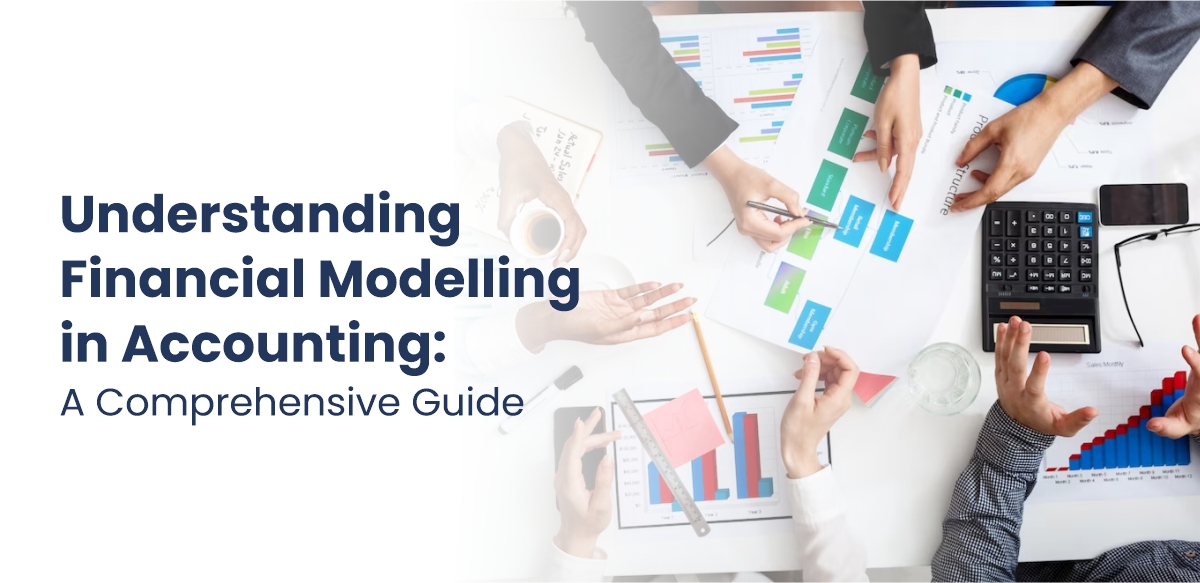Blog > Understanding Financial Modelling in Accounting: A Comprehensive Guide
Understanding Financial Modelling in Accounting: A Comprehensive Guide
December 28th, 2023

Understanding Financial Modelling in Accounting: A Comprehensive Guide
What is Financial Modelling in Accounting?
Applications and Types of Financial Models in Accounting
Benefits of Learning Financial Modelling in Accounting
- Enhanced Decision-Making
- Improved Forecasting Accuracy
- Efficient Financial Analysis:
- Diverse Roles
- Accelerated Career Growth
Financial Modelling Courses and Certifications in Accounting
Why Pursue a Financial Modelling Course in Accounting?
Empower Your Analysis: Learn Financial Modelling Techniques With upGrad Campus
- What is financial modelling in simple words?
- What are financial modelling skills?
- What is the role of modelling in financial accounting?
- What are the four major components of financial modelling?
Financial modelling in accounting serves as the bedrock of informed decision-making and strategic planning within the financial landscape. It entails the art of creating mathematical representations of a company's financial health, enabling predictive insights and fostering strategies for growth.
In this comprehensive guide, we aim to demystify the complex world of financial modelling in accounting. From understanding its role in predicting financial performance to exploring the avenues it opens for career advancement, this guide will illuminate the path to mastery in financial modelling within the accounting domain.
What is Financial Modelling in Accounting?
Financial modelling in accounting involves creating mathematical representations of a company's financial situation. It helps in forecasting, valuation, and strategic decision-making by utilising historical data and assumptions to project future financial performance.
These models assist in analysing scenarios, managing risks, and optimising financial strategies. Accurate and relevant financial models in accounting ensure precise insights into a company's financial health and facilitate informed decision making process.
Applications and Types of Financial Models in Accounting
Financial models in accounting are diverse and serve distinct functions.
1. Valuation Models
These are essential in determining fair values for financial reporting or investment purposes by estimating the worth of assets, businesses, or securities, aiding in investment decisions, mergers, or acquisitions.
2. Risk Models
Risk models help identify potential risks and develop strategies to mitigate them by assessing and managing risks like market volatility, credit risks, or interest rate fluctuations, ensuring risk mitigation strategies are in place.
3. Forecasting Models
Forecasting models assist in creating budgets and financial plans for the future. These models predict future financial performance based on historical data and trends, supporting budgeting and strategic planning.
4. Scenario Analysis Models
Scenario analysis models provide insights into potential outcomes under various conditions, supporting prudent decision-making in uncertain environments.
Benefits of Learning Financial Modelling in Accounting

A proficiency in financial modelling improves the understanding of a company’s financial performances, thereby improving career opportunities for those who have this skill.
Expertise in this field presents numerous advantages for accounting professionals. Here are a few benefits for you to consider.
1. Enhanced Decision-Making
Proficiency in financial modelling enables professionals to make well-informed decisions by accurately analysing complex financial data and extrapolating meaningful insights.
2. Improved Forecasting Accuracy
Expertise in financial modelling allows for the creation of robust models that enhance forecasting accuracy and predict future financial trends and outcomes.
3. Efficient Financial Analysis:
Mastery of financial modelling streamlines the financial analysis process, enabling professionals to swiftly evaluate company performances, identify trends, and interpret data more effectively.
4. Diverse Roles
Individuals adept in financial modelling unlock various career opportunities in accounting, including roles as financial analysts, risk managers, or financial consultants, where their modelling skills are highly valued.
5. Accelerated Career Growth
Proficiency in financial modelling often leads to accelerated career growth within the accounting domain, as these skills are integral for roles involving budgeting, valuation, and strategic financial planning.
Also Read: Financial Modelling and Analysis Course | Here’s Everything You Need to Know
Financial Modelling Courses and Certifications in Accounting
Finance certification courses focusing on financial modelling offer vital insights into financial statement analysis, forecasting, and risk assessment for accounting professionals.
Certifications like Chartered Financial Analyst (CFA), Financial Modelling and valuation Analyst (FMVA), or Certified Financial Modeler (CFM) equip individuals with advanced skills, validating their proficiency in modelling techniques.
These courses not only enhance expertise but also present placement opportunities, facilitating career growth and opening diverse paths in accounting, finance, and related fields.
Why Pursue a Financial Modelling Course in Accounting?
Enrolling in specialised finance courses with placement tailored for accounting amplifies proficiency in financial analysis and strategic decision-making within the accounting domain. Such courses not only equip professionals with in-demand skills but also offer networking opportunities and industry insights, fostering a deeper understanding of financial concepts and their practical applications.
A robust course typically includes a comprehensive curriculum covering financial statement analysis, valuation methods, risk assessment, and scenario analysis. These courses often integrate practical applications, utilising real-world scenarios, and provide hands-on experience with industry-standard tools.
Empower Your Analysis: Learn Financial Modelling Techniques With upGrad Campus
In short, mastering financial modelling in accounting opens a world of opportunities for professionals in the finance realm. The ability to effectively predict, assess, and strategise based on financial data is vital in today's competitive world. These specialised courses and certifications can provide the skills and information you need to succeed in finance and accounting.
If you want to elevate your expertise in financial modelling and explore the vast potential it offers in accounting, contact upGrad Campus today. Don't miss this chance to take your career to new heights.
FAQs
1. What is financial modelling in simple words?
Financial modelling uses Math and data to create a picture of a company's financial situation. It helps predict how a company might perform in the future, guiding decisions and strategies.
2. What are financial modelling skills?
Financial modelling skills involve Excel proficiency, understanding accounting principles, analysing financial statements, forecasting, valuation methods, risk assessment, and effective communication of complex financial data.
3. What is the role of modelling in financial accounting?
Modelling in financial accounting predicts future financial scenarios, aids decision-making, evaluates investments, manages risks, plans budgets, and guides strategic actions to improve financial performance.
4. What are the four major components of financial modelling?
Financial modelling comprises assumptions (key variables), historical data analysis, mathematical calculations to predict outcomes, and interpreting model results for decision-making and strategy development.
Also watch : https://youtu.be/PspGu9y_Edc?si=YfYi08m4Qb6gkHbv
Disclaimer: The success of job placement / interview opportunity depends on various factors including but not limited to the individual's qualifications, experience, and efforts in seeking employment. Our organization makes no guarantees or representations regarding the level or timing of job placement / interview opportunity. Relevant terms and conditions will apply for any guarantee provided by upGrad.






Add a Comment